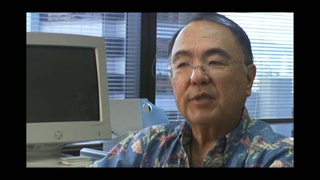Interviews
Resettling in Chatham
But it was tough, at the beginning. And I can remember overhearing a conversation of Jack Nishizaki, and he was an older Nisei gentleman at that point. He came from a large family and he was talking with his brothers - and now Jack is a black belt Judoist. They were talking, whispering. He said, “I was attacked by a bunch of guys that worked. They called me a dirty Jap, go home, and they tried to do a number. So I did a--” And described this move, and managed to disarm this violent attack and lay them out.
Well, I mean, shit. I had my own battles, going to and from school with much less skill and even lesser glory. It was difficult. Even little things, like I remember my father was able to buy a house. He was one of the first people to buy a house, and I grew up in the black ghetto of Chatham, the poor part of town. Chatham is rather unique in having such a thing as a poor black community because Chatham was once the terminal of the Underground Railroad. So growing up, I played with my Nisei friends and the black kids in the neighborhoods who were the descendants of runaway slaves.
Date: February 9, 2011
Location: California, US
Interviewer: Patricia Wakida, John Esaki
Contributed by: Watase Media Arts Center, Japanese American National Museum
Explore More Videos

Different tension between East Coast and Los Angeles
Japanese American Creative designer living in Japan

Being an American soldier and an "enemy alien"
(1923-2011) Lawyer, MIS veteran, founder of Francis and Sarah Sogi Foundation

Not relating to Japan Americans' experiences on the mainland
(1923-2011) Lawyer, MIS veteran, founder of Francis and Sarah Sogi Foundation


Less information about Hawai‘i in mainland
(b.1944) Founder of Kobayashi Group, LLC

A teenager's memories of how a local newspaper misrepresented Japanese Americans
(b. 1925) Draft resister

The role of the media in influencing people's opinions
(b. 1925) Draft resister

Living conditions in prison while serving time for resisting the draft
(b. 1925) Draft resister

Talking to children about decision to resist the draft during World War II
(b. 1925) Draft resister

Reflecting on Japanese Americans' response to incarceration
(b. 1925) Draft resister


First learning about the incarceration experience in college
(b. 1955) Lawyer

Feeling angry upon reading of Supreme Court case, 'Korematsu v. United States'
(b. 1955) Lawyer

Reasons for conformity and competitiveness in Gardena, California
(b. 1946) Lawyer

